Before I get to the main report this week on Dr Claire Bartram’s Kentish Book Culture online book launch, I thought I would draw your attention to the upcoming Annual Becket Lecture on Wednesday 16 December at 7pm on Teams Live Events. This online lecture will be given by Professor Paul Bennett MBE on ‘Canterbury during the Time of Thomas Becket’. Please note the lecture is free. You can find details through the Centre’s weblink at: https://www.canterbury.ac.uk/arts-and-humanities/events/arts-and-humanities/ckhh/canterbury-during-the-time-of-thomas-becket.aspx and to join please copy the long url below into your web browser and click on it a few minutes before the lecture which is due to start at 7pm: https://teams.microsoft.com/l/meetup-join/19%3ameeting_MjkzNTM5NDItMWQ1NC00MGM3LThiZWMtMWQwYTAyODUyMmRh%40thread.v2/0?context=%7b%22Tid%22%3a%220320b2da-22dd-4dab-8c21-6e644ba14f13%22%2c%22Oid%22%3a%225438ffb7-ff66-44f6-9ccf-cf504309571b%22%2c%22IsBroadcastMeeting%22%3atrue%7d we shall look forward to your company.
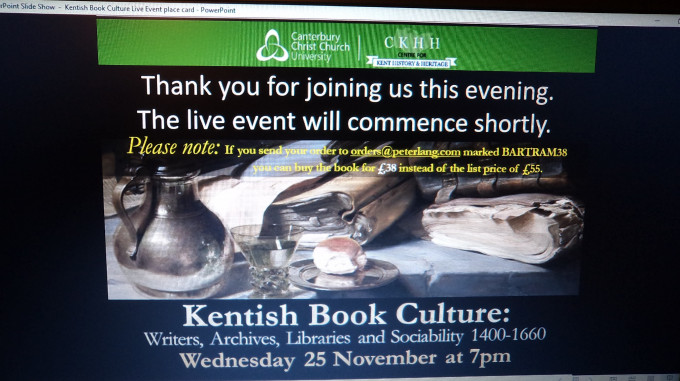
The second matter I want to mention is that Dr Diane Heath and I should get a chance to preview our first ‘Walkie Talkie’ this Friday on ‘Walking the City Walls’, which will be exciting. Paul Carney, with James Cook taking care of the technical side, have been very busy turning our recordings as we walked along a section of Canterbury’s city wall into a podcast to highlight matters relating to physical and mental wellbeing through exercise, specifically walking.
A third matter that I want to highlight is that Diane and I recently attended the inaugural meeting of the Canterbury Association for Medieval and Early Modern Studies (CAMEMS), which is a new charity outside the Canterbury-based universities, that brings together people interested in this long period of history. This initiative is the brainchild of MEMS post-doctoral students at the University of Kent with the aid of Claire Taylor and Dr David Rundle. One of its core aims is to provide an alumni network for MEMS postgraduates from the universities in Canterbury, a virtual and physical network of like-minded researchers and individuals, rather than ‘falling off a cliff’ that generally occurs when someone completes their doctorate. The organisers also want to build relations with local, regional and potentially national organisations that have similar aims in terms of providing events and other initiatives to further interest and scholarship in such areas. This provision of support, certainly initially, would be through matters like publicity – getting the word out about upcoming events and offering information about research opportunities, but might in time extend to other means.
Those at the meeting were enthusiastic about this initiative and having discussed the charity’s draft constitution, it was accepted unanimously, and this was similarly the case for the charity’s new officers. The charity will also have 3 trustees, and being voted on as one of them is, I feel, good for the Centre, and hopefully advantageous for this fledgling organisation. More on this in due course, because I am in talks with a 3rd group which may mean we can have a 3-way series of events coming up early next year.
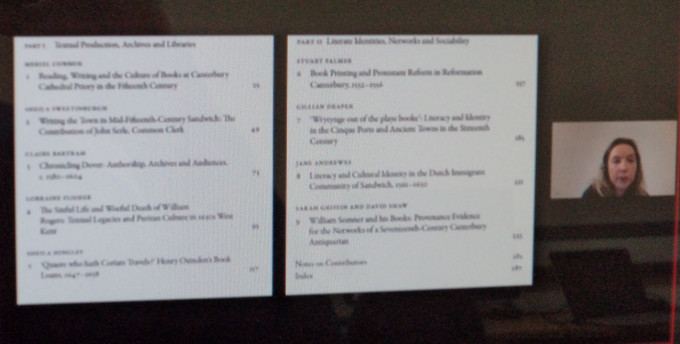
To return to the main report this week. As you will have seen on the photo above, for those interested in buying Kentish Book Culture, the publisher is offering a discount – email your order to orders@peterlang.com including the code BARTRAM38 to buy the book for £38 rather than the list price of £55.
Claire, an expert in regional book history, began her presentation on the book by discussing the key elements she sees in this exploration of book culture in Kent, not least the extraordinary collection of individuals who through their various activities and networks engaged in the producing, acquiring, collecting, sharing and promoting of a wide range of works. Furthermore, many might be said to be have been imbedded in aspects of contemporary Kentish society, whether we are talking about the early recognition of the value placed on the written word in the Cinque Ports, the desire to inform those in and around 1530s Canterbury of reformist religious ideas through the printed word, or the role of the gentry, and even some among their social inferiors, as producers and patrons of texts including Somner’s Anglo-Saxon/Latin/English dictionary, and works by others on good husbandry and the county’s history.
Thus how and why individuals and institutions, be they ecclesiastical or civic, constructed archives was another area Claire explored, as well as the sense of connectedness through the networks people and organisations used to borrow, copy, donate and acquire not only manuscripts and books but the knowledge about them as objects – where they had been, in whose library, and who might have read them. This brings me on to another point Claire raised, the power of friendship as evidenced through the lending say of books from Henry Oxinden’s library, or the use of the play book for the men of New Romney to perform their play ‘a right’. And it is these continuities across time that I’ll use as my final idea from Claire, that thematically social exchange through the written/printed word while obviously not unchanging over the centuries, yet still Kent’s position between the pull of London in one direction and continental Europe the other, seems to have generated an appreciation of ‘book culture’ that makes it an extremely rich region to study.
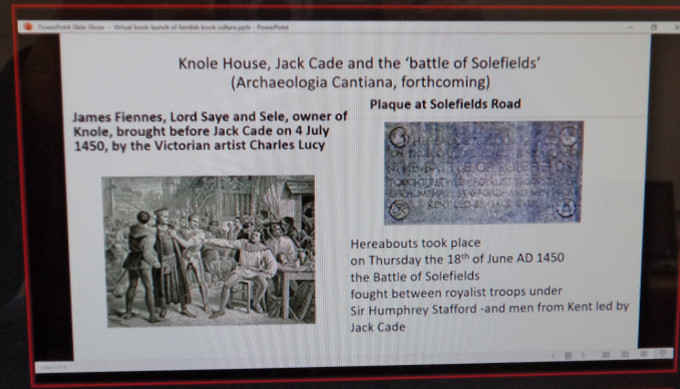
Taking this in some ways as a cue, Dr Gillian Draper, the Events and Development Officer of the British Association for Local History and the first of four contributors to Claire’s book, offered some ideas from her current research projects. In particular, she has been investigating the role of men such as Sir John Fogge who had founded the chantry college at St Mary’s parish church in Ashford. For through the use of inscriptions and stained glass, as well as the possession and sharing of books and musical instruments, such men were establishing literary networks, enhancing the provision of education and ensuring their biographies in stone, lead and glass were preserved for posterity.
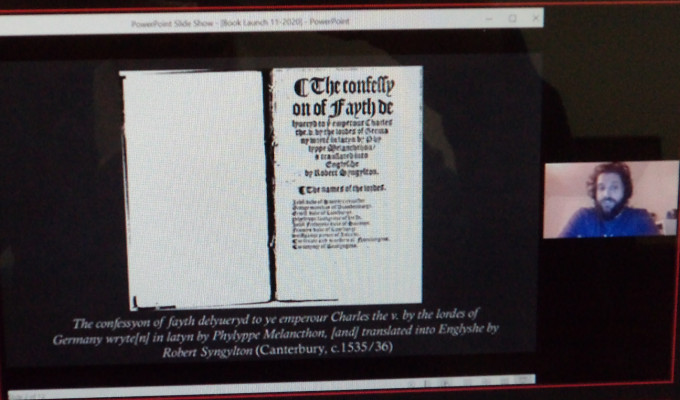
Dr Stuart Palmer, the next book contributor, followed Gill. Now at Sidney Sussex College, Cambridge, Stuart is expanding his doctoral study of early Tudor Canterbury to investigate more fully the networks involving writers, printers, patrons and consumers of reformist texts and the routes they ‘travelled’ between mainland Europe, Kent and London. Thus by following the careers of a translator – Robert Syngylton, a printer – James Mychell and a school master – John Twyne, and their web of contacts and associates, he is developing an understanding of the tensions in Canterbury and beyond. For in 1530s Kent Lutheran ideas might be said to have been mainstream, albeit they were to a degree polarising opinion in the county. Therefore, it is perhaps not surprising that Thomas Cromwell was in correspondence with sympathisers in places such as Canterbury and Dover, as well as employing plays in the form of Bale’s ‘King Johan’ to articulate these ideas through the power of preaching and drama – the spoken written word.
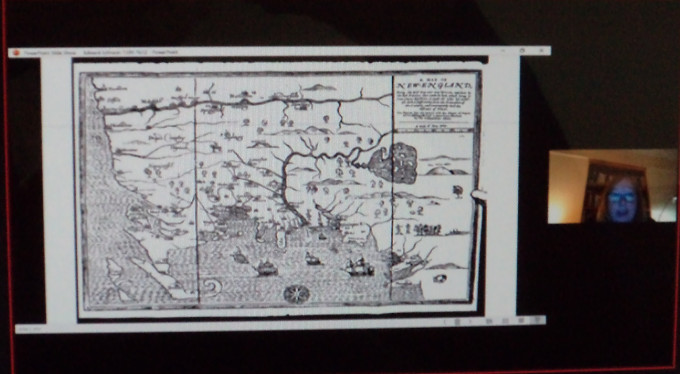
In a sense keeping us in Canterbury, but also taking us to New England, Dr Lorraine Flisher, the 3rd contributor and an Associate Lecturer in Early Modern History at CCCU, explored the life of Edward Johnson. Born in Canterbury in 1598, Johnson’s family were local landholders, and he grew up in a literate household. As a young man he travelled to New England in 1630 as part of the visionary expeditions to establish a new Puritan Jerusalem in the wilderness, taking the Israelites as their example. He returned to Kent the following year to collect his family and, having sorted out his business affairs, they sailed west in 1635 on the Hercules. Johnson was obviously an enterprising individual, rising to become an important citizen of the town he helped to found called Woburn in Massachusetts. Furthermore, in terms of book culture, he wrote a Puritan history of the establishment of New England, deploying the comparison with the Israelites as he and his fellow settlers had sought to found a godly commonwealth where once there had been ‘desert’. Not that he was the only writer of such a history, but, as Lorraine pointed out, he is the only one who focused on the entire group – the tribe, rather than on specific individuals. Not that his book was a best seller, but that is not its primary significance, albeit its later history as a text is highly intriguing.
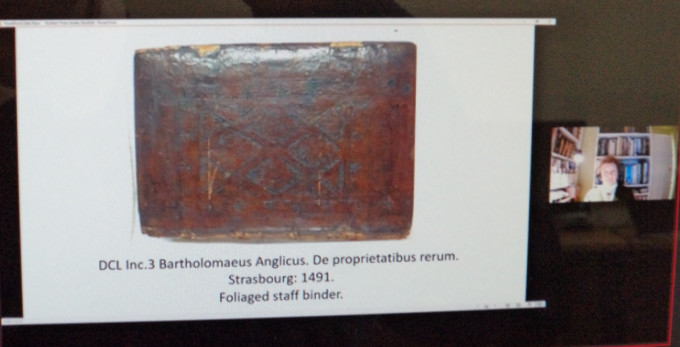
Dr Sheila Hingley was the final speaker, and another contributor. As many may know, she was formerly the librarian at Canterbury Cathedral Library and more latterly until her retirement the Head of Heritage Collections at Durham University. Recently Sheila has taken on a fascinating project to catalogue and research the early printed books at Durham University, the books in the cathedral library and these from Ushaw College. To a degree, she is drawing on the work of earlier experts such as Alan Piper and Barry Dobson, but she is taking this project much further, including investigating matters such as material culture in the form of the bindings, the printed book trade in Oxford and the interaction between Durham Cathedral Priory and its college in Oxford. This latter research has opened up another direction and she is now seeking to compare this Durham–Oxford relationship with that between Canterbury Cathedral Priory and its own Oxford college, not least because they were very different.
Throughout the presentations a number of questions had come in and these were addressed by the various speakers, from the presence in Canterbury of contemporary copies of the works of Aphra Benn to the activities of those below the gentry in these networks of book sharing and literary production. At this point I drew the evening to a close, but not before thanking the speakers for what a member of the audience called “an excellent event with some impressive presentations”, Diane Heath’s great work as producer, Craig Dadds’ excellent book display in the CCCU Bookshop, and our audience’s contribution, because without them the whole event would have been pretty pointless!
 Centre for Kent History and Heritage
Centre for Kent History and Heritage Sheila Sweetinburgh
Sheila Sweetinburgh 1134
1134

